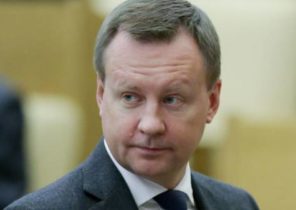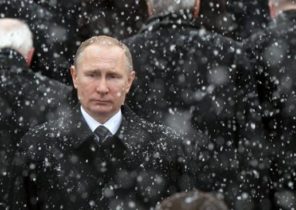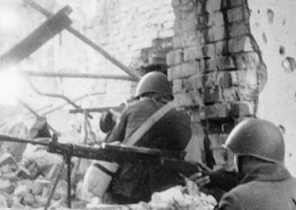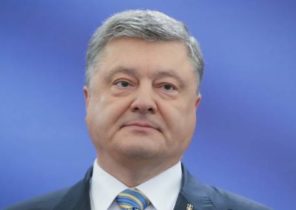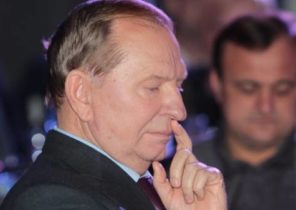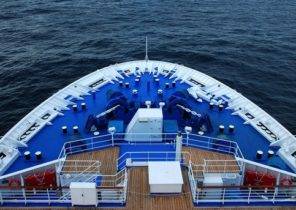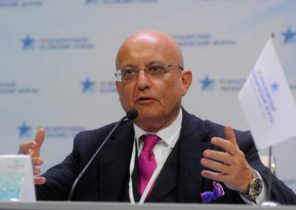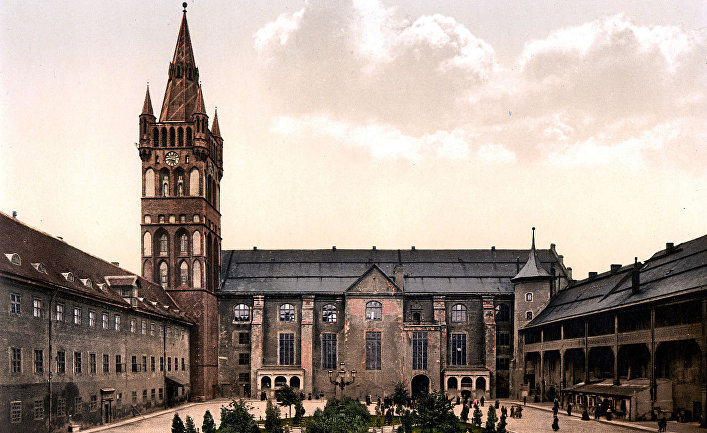
A small sign difficult to see.
In the center of Kaliningrad there is a street named in honor of the hero-the Communist Nikolay Shchors. The sign of house number 11, however, signed something else: Wißmannstraße.
Is the German name of the street of those times, when Kaliningrad was the capital of East Prussia. These signs recently appeared on several homes.
“Creeping Germanization”, — commented on in the past year the situation with the advent of signs for public channel local television.
Kaliningrad, the capital of the Kaliningrad region, located on the shore of the Baltic sea − an unusual Russian town.
This can be explained by geographical and historical reasons. The Kaliningrad region between Poland and Lithuania, has no land communication with the rest of Russia.
The territory was passed to the Soviet Union after the Second world war. It became part of the RSFSR, and after the Soviet collapse — the lonely island between newly independent Lithuania and Latvia.
Around street Shchorsa there are disputes.
Almost all of the königsberg was destroyed during the Second world war before the Red army recaptured it in Nazi Germany. In this part of the city, however, survived a quarter of the houses built by the Germans. District with buildings in the art Nouveau style became an island in the middle of the Soviet construction. In addition to the buildings of the Soviet time, there’s a lot of shopping centers.
“People appreciate the heritage of time,” said activist Jacob Grigoriev on the sign.
Last spring Grigoriev collected signatures in support of the idea of renaming Kaliningrad to Koenigsberg. He managed to collect about two thousand signatures. State television channel called Grigorieva a “Russophobe”. Local television is again reminded of the “Germanization”.
“Always, when this topic is raised, there are accusations of separatism,” he says.
These separatists, that is, people fighting for the independence of Kaliningrad or attaching it to Germany, very little, and no one takes them seriously. Grigoriev and supporters of the renaming of the city consider him an integral part of Russia, but I want to remind you about its history.
The idea of renaming angered many, although businesses love to use the name “königsberg”. Many see no reason to change the name, because it has an important symbolic value, Recalling the victory over the Nazis.
Under Russian law, for separatism can assign jail time. Even the mention of separatism can lead to trouble.
When in March 2014, Russian flags have started to appear on the flagpoles in the Crimea, some Kaliningradians hung on the FSB flag of Germany. All activists had to sit out for about a year.
Such punishment as discussions with local public television channel about the Germanization considered a warning. The economic crisis has hit areas around the EU, and the people reacted quite sensitively to what is happening.
“The authorities had to be very careful. In Kaliningrad the votes are counted mostly correctly”, − said Grigoriev.
“We can always go to Europe and compare”.
70% of Kaliningrad residents have a passport, is more than anywhere else in Russia. For a couple of hours drive you can reach the Gdansk airport in Poland and buy cheap flight to any of a dozen cities. In this price race Moscow flights are much lower.
Although local often travel to EU countries than in other parts of Russia, brought food from the EU, only to go on the machines, produced abroad, going to Moscow, they say “go to Russia”, they are Russians.
According to the study conducted by the Baltic Federal University of Immanuel Kant, now more residents of Kaliningrad call themselves Russian than in the early 2000s. the Researchers believe this is due to the General development in Russia in the 2000s.
“However, there is their Kaliningrad identity as part of Russian-ness” − said the chief editor of the city newspaper “Your Bro” Mikhail Miroshnikov. He was not in favour of changing the name of the city.
Miroshnikov sitting at a corner table of the bar “Yeltsin” and refers to the causes of Kaliningrad culture. The bar, named after Boris Yeltsin, large Windows, hanging from the ceiling bulbs, the bartender pours Lithuanian wheat beer.
“The first of the current residents moved here only in the postwar 1940s. After the war, the Germans left the territory,” he says.
Gradually the community, which was proud of its territory and sought to develop it. This community mainly consisted of Russian, but initially, all were newcomers.
“So people are pretty tolerant. Not necessarily a liberal, but tolerant”.
In addition, people often visit EU countries.
Closer to the evening bar “Yeltsin” is filled people.
“I’ve lived here for seven years, and in my hometown I am often asked whether I feel Kaliningradskoi,” laughs Xenia Poluorlova from Moscow.
She says she’s not noticed that much difference between Kaliningrad and other Russian.
“It is very easy to root. People initially had to be social, so there is such a culture”.
However, there are snobs here.
“Some argue that here was born their grandmother. If they are the elite, like an old American family.”
The city is named in honor of Bolshevik
Kaliningrad has a long history, although in 1945, almost everything had to start anew.
The Germans founded königsberg in 1255.
 © RIA Novosti, Igor Zarembo | go to photolanguage Russia. Kaliningrad
© RIA Novosti, Igor Zarembo | go to photolanguage Russia. Kaliningrad
The city was separated from Germany after the First world war, when the country lost territory in the Treaty of Versailles.
The region was returned to Germany, when came to power the Nazis, and in 1939 the country was invaded Poland and later the USSR.
In the spring of 1945, after heavy fighting, the Red army captured Koenigsberg.
After the war, the North of East Prussia was annexed to the Soviet Union. Konigsberg and the entire territory was named Kaliningrad in honor of Mikhail Kalinin, a Bolshevik.
The USSR turned on the Kaliningrad part of the RSFSR, and after the Soviet collapse in 1991, it has become an isolated territory. Now in the city of about one million inhabitants. Baltiysk, located in the same region, is the main military base of the Russian Baltic fleet.
Kaliningrad, located between Poland and Lithuania, NATO’s strategically important for Russia. Russia has increased its military presence in Kaliningrad.
